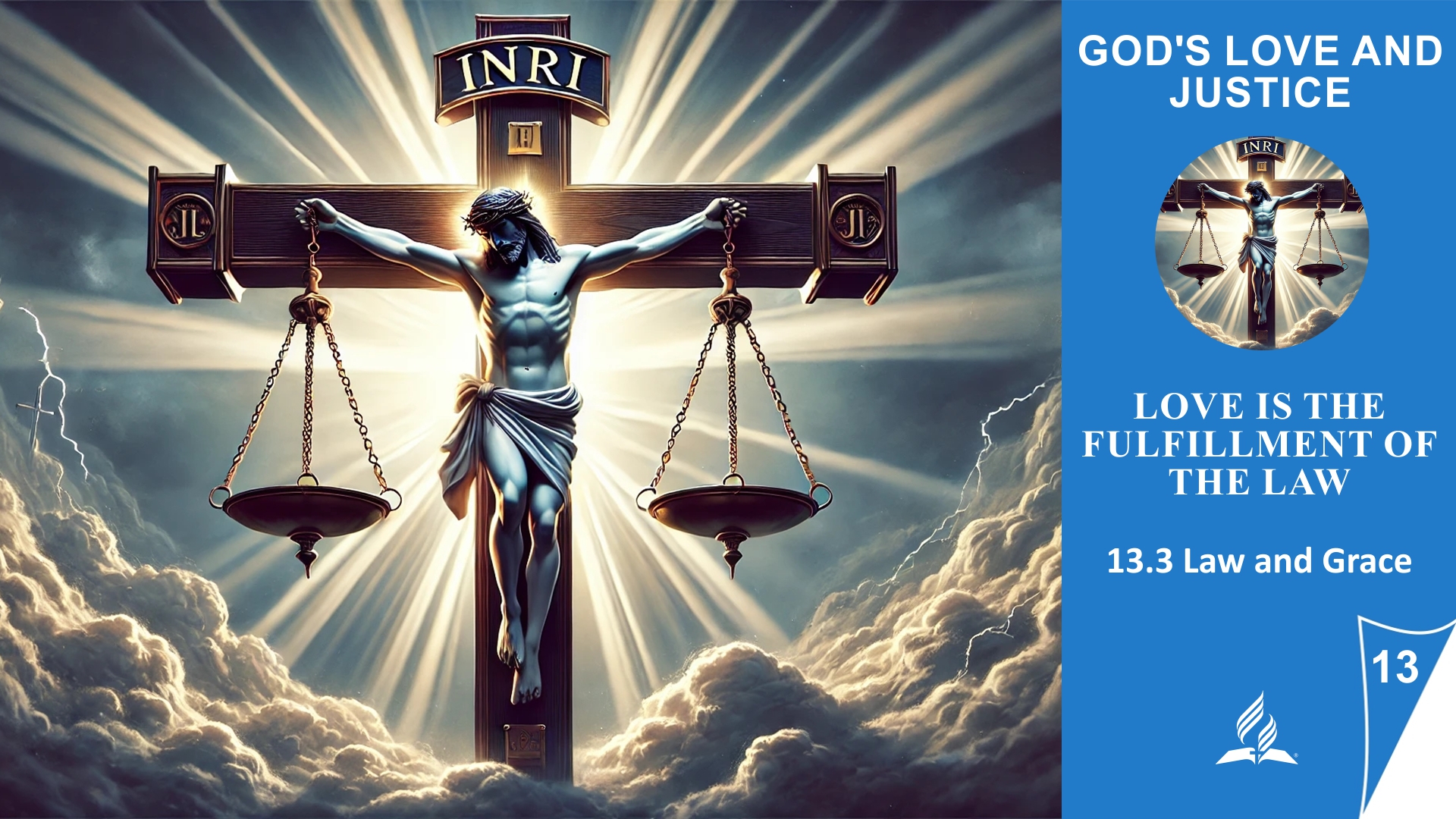


13.3 Law and Grace
Grace and Law – Two Paths, One Goal: Salvation in Love
Read Jeremiah 31:31–34. What does this passage teach about God’s promise to give us a new heart? Compare this with the words of Christ to Nicodemus in John 3:1–21 concerning rebirth. Also, see Hebrews 8:10.
The connection between law and grace is not a contradiction but a divine interplay. In Jeremiah 31:31–34, God promises a new covenant that is fundamentally different from the old one: instead of demanding the law only externally, God intends to write it on the hearts of His people. This signifies nothing less than a radical inner transformation—a change of character by the work of God’s Spirit.
Jesus picks up on this promise in His conversation with Nicodemus (John 3). He declares that unless one is born again—from water and the Spirit—one cannot see the Kingdom of God. This new birth is the fulfillment of what Jeremiah announced: a new heart, renewed by God Himself through the Holy Spirit.
The author of Hebrews (Hebrews 8:10) confirms that this new covenant has been made a reality through Jesus Christ. God’s law—which was written on stone tablets in the Ten Commandments—is now meant to become part of our very being. It is not to be imposed from the outside but lived from within. This transformation is only possible through the grace of God.
Law without grace makes us perpetual debtors with no hope.
Grace without law, on the other hand, would be like a compass without a north—providing no clear direction.
Yet in Jesus Christ we find both:
• Grace that saves us (Ephesians 2:8),
• and a law that shows us the way (Romans 7:7).
We do not keep the law to be accepted; rather, we keep the law because we are already accepted. We obey not out of fear, but out of love (John 14:15). Love is the power that enlivens the law—and it comes solely through the Spirit working within us.
✨ Conclusion:
God’s law is an expression of His very nature—holy, just, and good. But it is only through the grace found in Christ that it is written on our hearts. Grace forgives, and the law directs. Together, they shape a life that honors God and loves our neighbor. Such a life is not outwardly pious but inwardly renewed—obedient from the heart.
What is your hope in the day of judgment? Is it your meticulous and conscientious adherence to the law, or is it the righteousness of Christ that covers you? What does your answer say about the function of God’s law in terms of what it can and cannot do?
This is a deeply personal and theologically significant question—a question that strikes at the very heart of the gospel:
🔹 What is my hope in the day of judgment?
Not my adherence to the law, however earnestly I strive to keep God’s commandments.
Not my diligence, no matter how hard I work.
But solely the righteousness of Jesus Christ, which is given to me as a gift of grace through faith (Philippians 3:9).
I believe that only the righteousness of Christ will sustain me on the day of judgment—not as an excuse to ignore the law, but as deep gratitude that Jesus has accomplished what I could never achieve by my own strength.
🔹 What does this say about the function of God’s law?
The law shows me what is good and right—and at the same time, it reveals that I cannot perfectly uphold it (Romans 3:20).
It is like a mirror: It shows me the dirt, but it cannot wash it away.
👉 What the law cannot do:
• It cannot save me.
• It cannot erase my guilt.
• It cannot bestow righteousness upon me.
👉 What it can do:
• It reveals God’s character.
• It shows me where I need forgiveness.
• It leads me to Jesus, the only Savior (Galatians 3:24).
• And it serves as a guide for living a life of love—not out of fear.
✨ My Hope in the Day of Judgment?
Jesus alone.
His blood. His righteousness. His victory.
And because I am secure in Him, I love His law—not to save myself, but because I have been saved.
“For there is now no condemnation for those who are in Christ Jesus.” (Romans 8:1)
The relationship between law and grace is not merely a theological truth—it affects our daily thoughts, feelings, and actions in very practical ways.
-
A New Heart in the Midst of Daily Life:
When God promises in Jeremiah to write His law on our hearts, it means our faith is not just theory. It is about an inner transformation that shapes our character, our decisions, and our interactions with others:
In stressful situations, the Spirit reminds us of patience.
• In moments of temptation, He shows us the better way.
• In our dealings with others, He guides us toward love instead of judgment.
The new birth through water and the Spirit (John 3) is not a one-time event but the beginning of a renewed lifestyle—every single day.
-
The Law as a Guiding Principle—Not a Burden:
Every day, we face moral questions:
How do I handle conflicts?
• How honest am I in my work, in conversations, or when no one is watching?
Here, God’s law provides clear standards—without condemning us. Through the grace of Christ, we no longer view the commandments with fear, but as a guide for a life filled with love.
-
Grace as a Source of Strength:
When we fail—and we all do—grace is not a cheap get-out-of-jail-free card; it is an invitation to repent. It softens our hearts, reorients us, and motivates us to live with gratitude.
-
A Faith That Carries Us, Even on Judgment Day:
In a world that often values achievement and self-optimization, we must know: Our security is not in our performance but in the righteousness of Jesus.
This brings us peace—and frees us to live boldly, with love and courage.
✨ Final Conclusion for Daily Life:
• Hold fast to grace, especially when you fail.
• Live the law, not out of obligation, but out of love.
• Allow yourself to be renewed every day through prayer, God’s Word, and the Holy Spirit.
• And above all, trust in Jesus—in everything.
For in both our daily walk and on the day of judgment, it holds true:
“Christ in you, the hope of glory.” (Colossians 1:27)

True grace does not lead us away from the law but writes it on our hearts.
(Visited 21 times, 1 visits today)






















